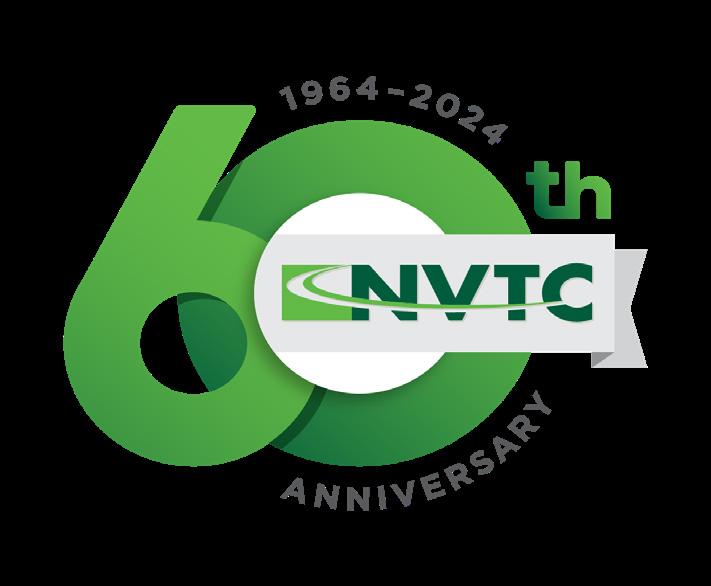


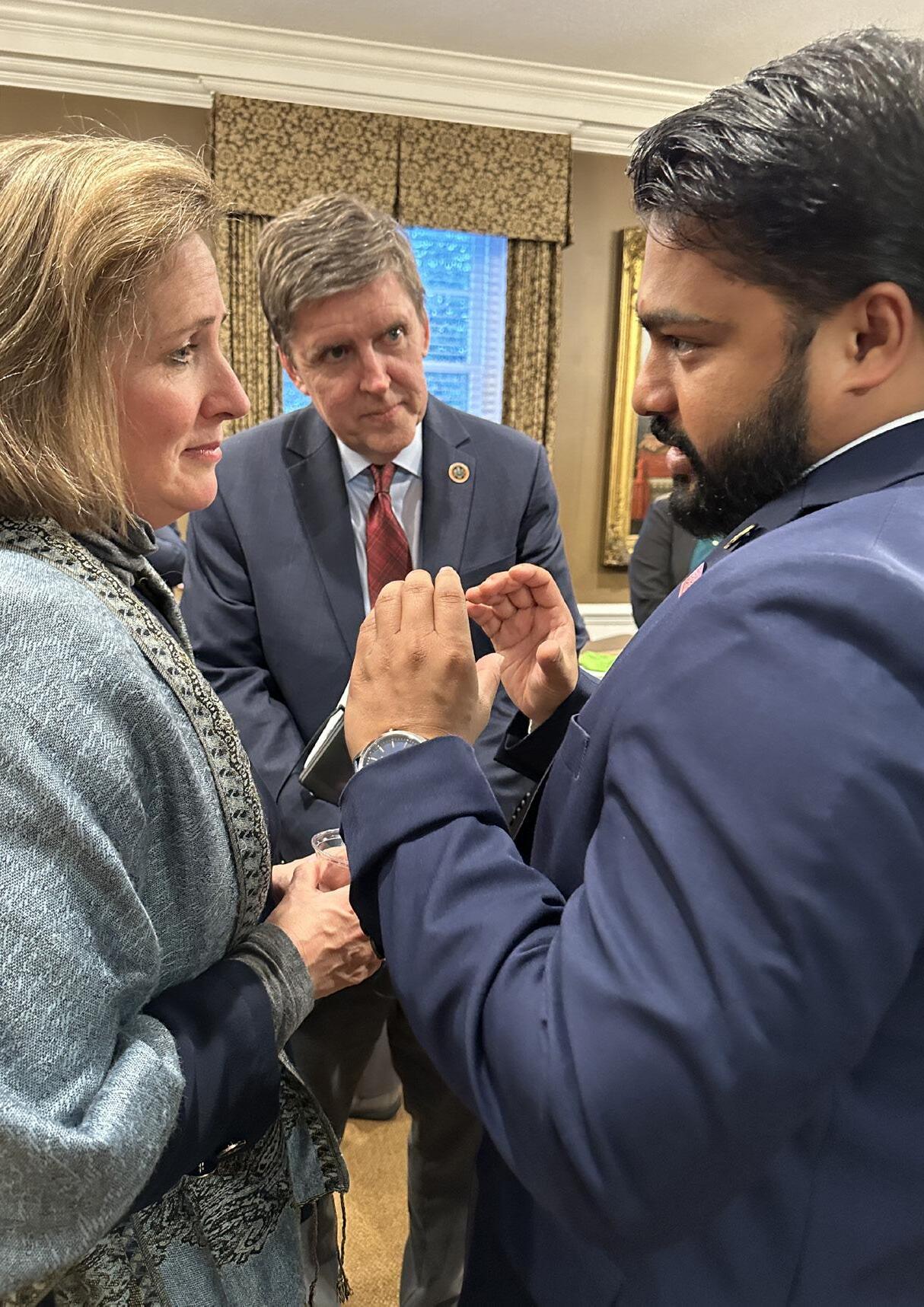




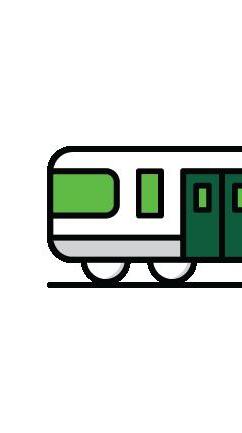




















60 years ago this month, something happened that would transform the landscape of Northern Virginia. In March of 1964 Gov. Albertis Harrison signed the bill creating the Northern Virginia Transportation District and the Northern Virginia Transportation Commission. The Transportation District Act 1964 stated, “The development of transportation systems, composed of transit facilities, public highways and other modes of transport, is necessary for the orderly growth and development of the urban areas of the Commonwealth; for the safety, comfort and convenience of its citizens; and for the economical utilization of public funds.” In practical terms, the law acknowledged the need for public transit and established the Commission to be the voice for Virginia in the planning of what would become the Metrorail system.
The first Metro stations opened 12 years later in the District of Columbia followed by the establishment of the Blue Line to National Airport in 1977, extending Metro to Virginia. The Orange line to Ballston followed in 1979. Today, Virginia is home to 32 of Metro’s 98 stations running on four lines: Blue, Orange, Silver and Yellow.
However, building and growing Metro wasn’t the end of the line for NVTC. Commissioners recognized the need to provide other transportation options for those who didn’t live near those Metro corridors. This need led to the creation of Virginia Railway Express, running on existing tracks on the Fredericksburg and Manassas lines and providing an alternative to driving on the notoriously congested I-95 or I-66 highways.
NVTC has undertaken other momentous work in our 60 years, like managing the Commuter Choice program, which has funded $156.2 million in congestion-relief projects since 2017. We also have a long history of promoting regional cooperation and conducting important research to underpin decision making on transportation.
So how do we celebrate 60 years of achievements? With two major events. Mark your calendars for the morning of Friday, June 14 for our Transit Innovation Summit looking at research and planning in public transit. On the evening of Thursday, September 5, in place of our usual Commission meeting, we’re throwing a gala—our 60th Anniversary Celebration and Documentary Premiere. Watch your inboxes for information on how to register for both events. Meanwhile, be sure to follow us on social media where we’ll be sharing nuggets of our 60 years of advancing transit in Northern Virginia. [2]

4
Legislative Reception in Richmond draws GA members, Commissioners
5 Commonwealth Transportation Board makes I-66 Commuter Choice whole from pandemic revenue shortfalls
6 Program Advisory Committee hears NVTC's strategic plan for research
7 NVTC staff brief Falls Church Council on Envision Route 7
8 Metro Board hears updated budget proposal, on track to close near-term funding gap
9
10

March
March 19
April 4
April 11
April 16-17
April 19 VRE


@NoVaTransit


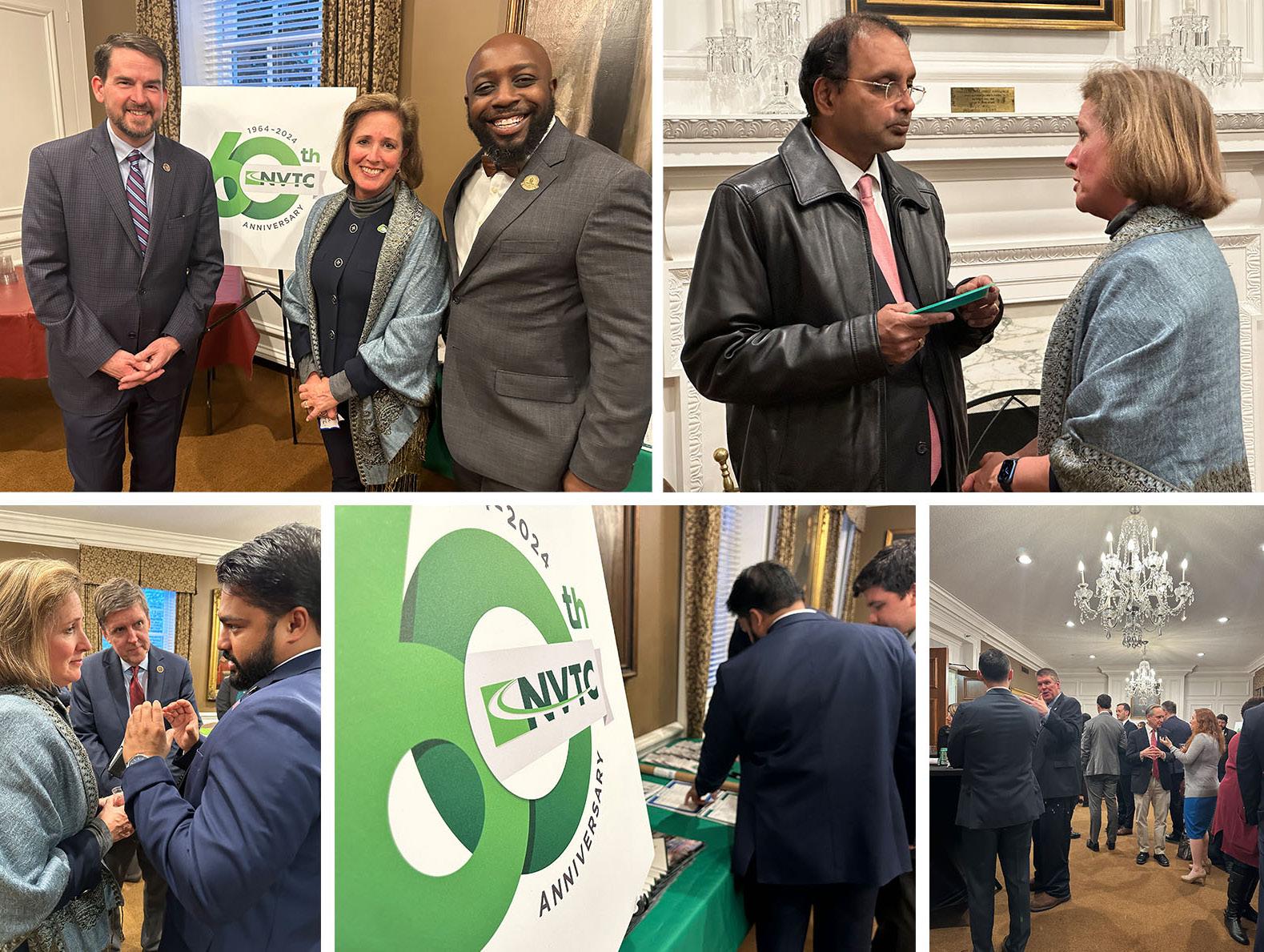
In lieu of our usual February Commission meeting, we held our first-ever Legislative Reception in Richmond on February 1. The event, co-sponsored by Commonwealth Strategies Group, brought together a number of Virginia's senators and delegates, NVTC Commissioners, appointees from the secretary of transportation's office and other jurisdictional and transit partners.
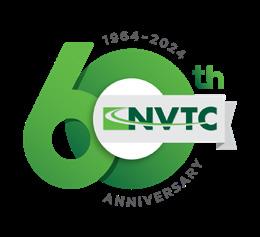
The reception was also our first event celebrating NVTC's 60th anniversary.





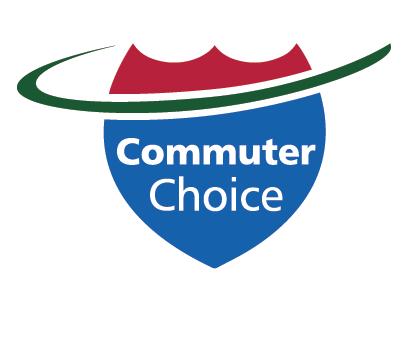

The Commonwealth Transportation Board (CTB) acted on February 20 to make up for reduced toll revenue payments to NVTC's I-66 Commuter Choice program during the COVID-19 pandemic. NVTC will soon receive a $16.6 million payment from the Department of Rail and Public Transportation (DRPT) that will be available for investment in new I-66 Commuter Choice projects. The $16.6 million, which will be funded through I-66 Outside the Beltway concessionaire payments to DRPT, represents the difference between the payments that NVTC received from the Virginia Department of Transportation (VDOT) in FY 2020, 2021 and 2022 and the amount that NVTC would have expected to receive per the I-66 Memorandum of Agreement. NVTC compensated for the
reduced revenue with smaller FY 20212022 and FY 2023-2024 Programs of Projects. I-66 toll revenues have since fully rebounded and NVTC received its full, expected payment from VDOT in FY 2023.
Sen. Mark Warner gestures as Virginia members of the U.S. House hold a check and Gov. Glenn Youngkin looks on.
NVTC is grateful to our Commonwealth partners at VDOT, DRPT and the CTB for addressing the shortfall. To ensure prudent investment of the funds, NVTC proposes conducting an I-66 Corridor Needs Assessment with DRPT during FY 2025 to identify the full set of long-term investment needs for transit and multimodal improvements that I-66 Commuter Choice and DRPT's Outside the Beltway funding could help to fulfill, including for transformative, long-term capital projects.


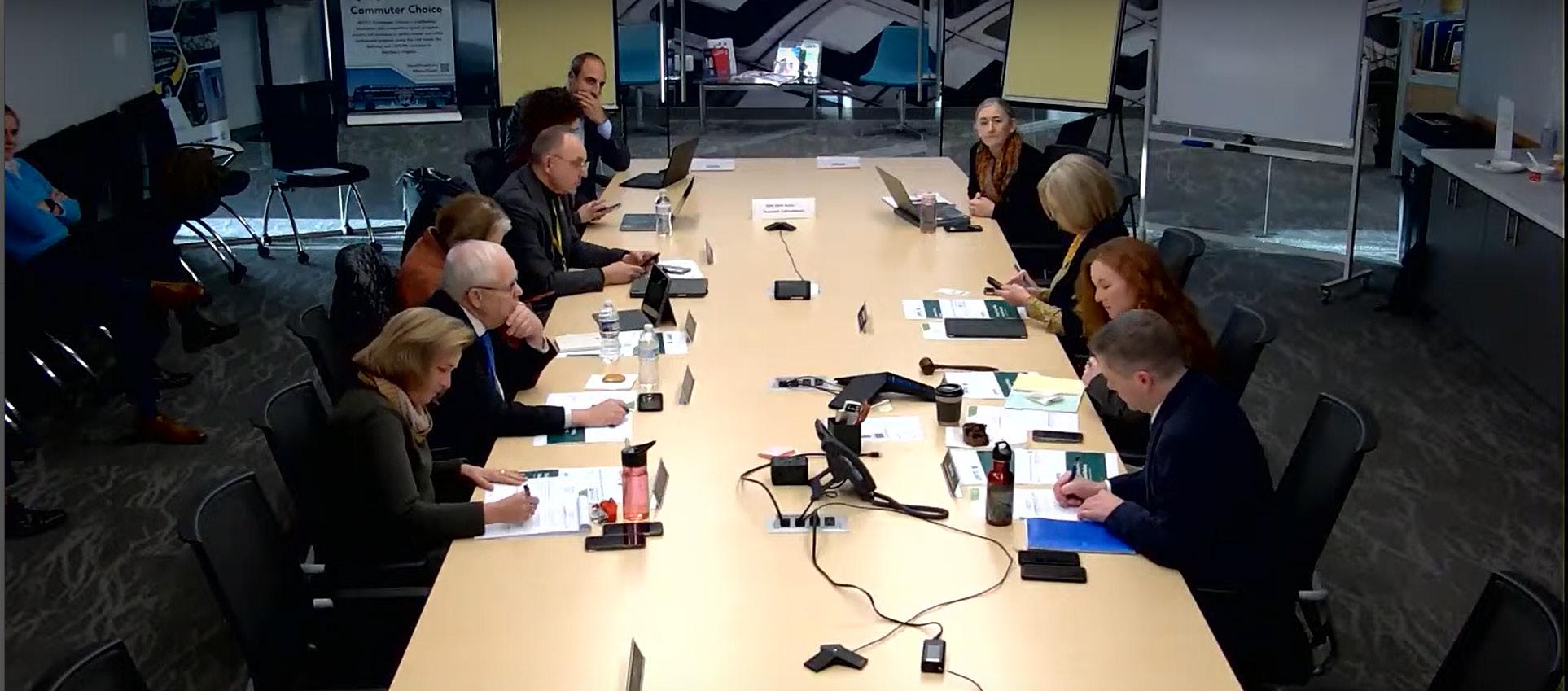
Members of NVTC's Program Advisory Committee (PAC) met February 15 to hear about staff work on a Strategic Transit Policy Research Roadmap. The project, with the help of a consultant team, supports staff in developing a strategy for regional transit policy research over the next four to six years. Staff and the consultant team, including InfraStrategies and the Eno Center for Transportation, conducted a strategic planning exercise with Commissioners to get their input on the strategic vision of NVTC’s research priorities. These inputs will be used to help develop a refined vision and research priorities to help develop our policy research agenda moving forward.
Ben Owen also updated the PAC on I-66 Commuter Choice. The committee reviewed the $21.5 million of eligible transit and other transportation projects to be considered for FY
2025-2026 funding, which include continuations of several successful bus services and commuter incentives previously supported by the program and a staff proposal to fulfill the outstanding $8 million Commuter Choice funding commitment to construction of a new, expanded Crystal City VRE station under the current I-66 Program of Projects rather than the next I-395/95 program, given available funding and the project's unique benefits to commuters in both program corridors.
The committee also discussed staff's proposal to conduct an I-66 corridor-wide needs assessment in collaboration with the Department of Rail and Public Transportation. The needs assessment would identify I-66 Commuter Choice's potential role in supporting long-term, transformational capital projects such as WMATA's proposed Rosslyn Metrorail improvements as well as menus of effective near- and longer-term transit and multimodal improvements that applicants could pursue in future I-66 Commuter Choice funding rounds to meet commuters' travel needs.


Senior Program Manager, Vikram Sinha, and Director of Programs and Policy, Allan Fye, briefed the Falls Church City Council on the Envision Route 7 Phase 4-1 study February 26. Envision Route 7 is a planned Bus Rapid Transit (BRT) system that would run from Tysons to Alexandria, by way of Falls Church and Seven Corners. Discussion centered around bus priority enhancements on both Broad Street and N. Washington Street, and integration with regional
bus projects. Staff presented three scenarios for the city, all of which will improve bus service. While the city has submitted an application for NVTA funding for elements of the project, NVTC staff also shared opportunities for funding at Department of Rail and Public Transportation and NVTC's Commuter Choice program that would allow Falls Church and the region to realize the project on a faster timeline.

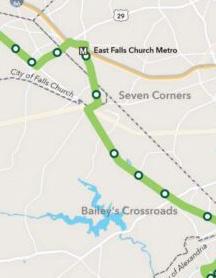

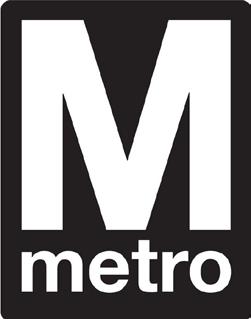
Metro Board hears updated budget proposal, on track to close near-term funding gap
Metro's Board of Directors reviewed GM/CEO Randy Clarke's updated proposed budget for FY 2025, which avoids the drastic service cuts outlined in the previous proposal, at their meeting February 8. The agency still faces a $750 million operating deficit for the next fiscal year, but Metro says anticipated funding commitments from the District, Maryland and Virginia, as well as temporarily shifting some money from preventative maintenance, closes the gap for the upcoming fiscal year, resulting in
a balanced operating budget proposal totaling nearly $2.3 billion, with a capital budget proposal of $2.5 billion. This updated proposal also freezes wages of non-represented employees and two of Metro's largest collective bargaining units, seeks cost efficiencies, optimizes service and increases fares. The commitments announced by the District, Maryland and Virginia may be subject to change as the Metro Board reconciles the announced commitments against the agency's funding formula.
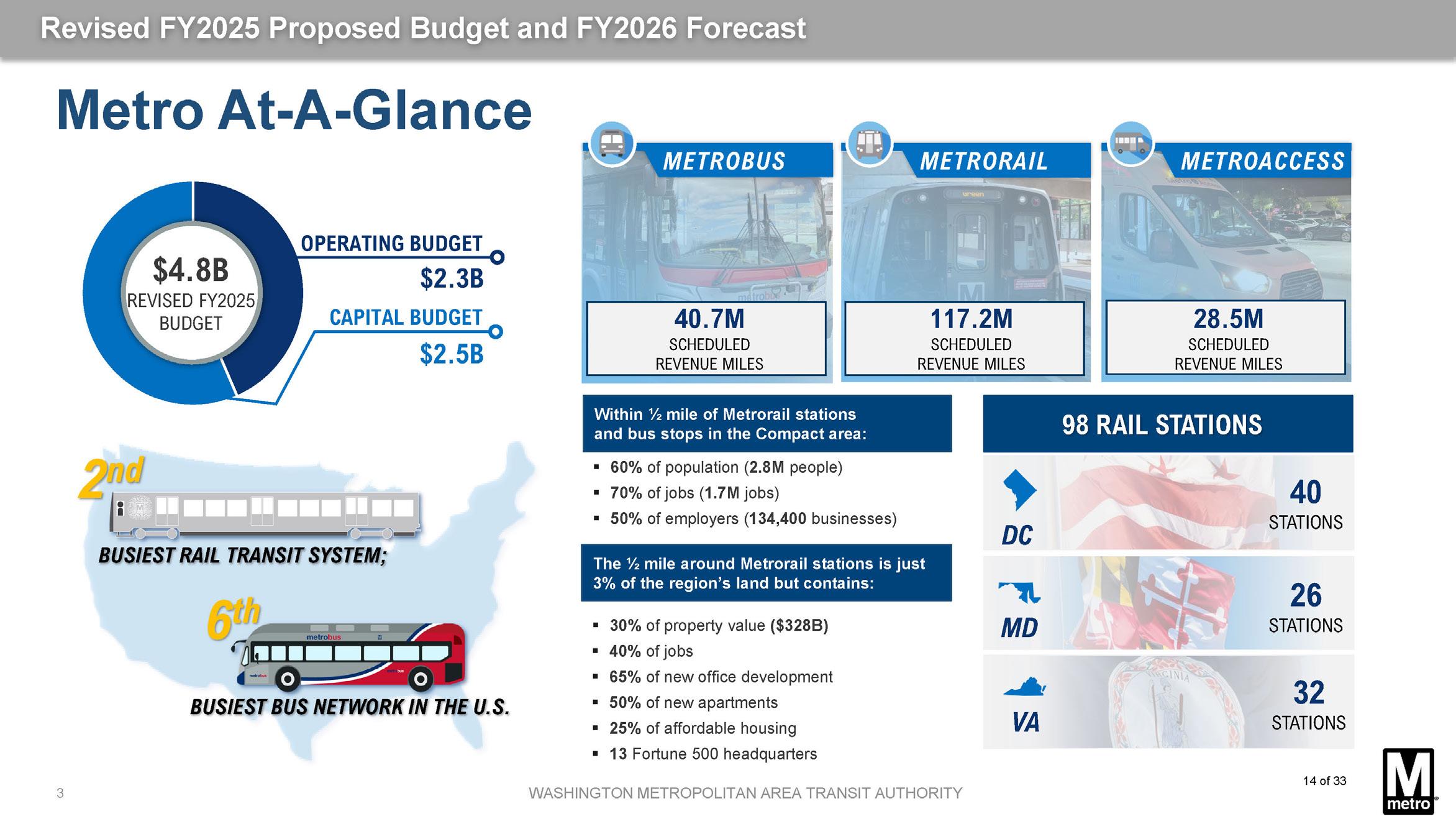





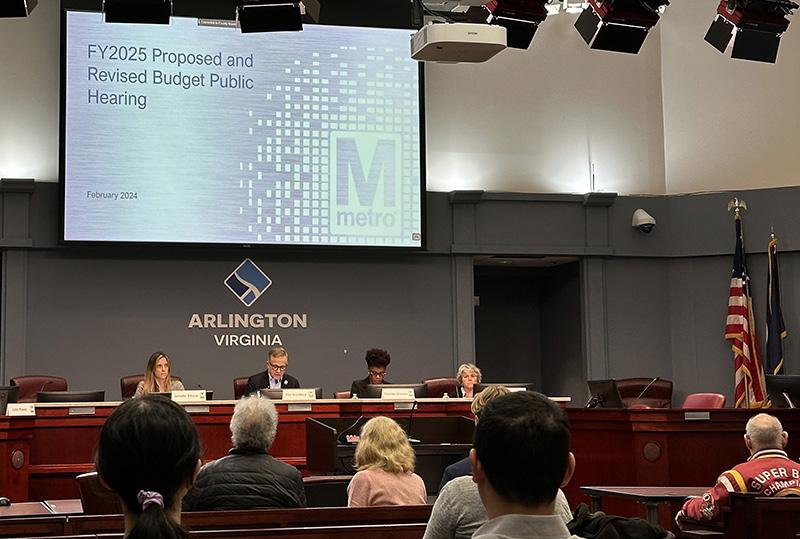

Metro hosted a Virginia-focused public hearing on the proposed and revised FY 2025 budgets at the Arlington County Government Center February 28. Metro Board Chair and Commissioner Paul Smedberg chaired the meeting, which gave the public an opportunity to testify in person about the impacts of the proposals. Metro faces a $750 million operating deficit (as of June 2023) and the agency's original budget proposal reflects dramatic service cuts. Metro also released a revised budget that counts on additional funding from the District
of Columbia, Maryland and Virginia to minimize service reductions. Participants included Commissioner and Arlington County Board Vice Chair Takis Karantonis, who said, "It's of course part of my job to make everything in our power to find solutions here most importantly, viable and sustainable solutions for the future. I implore you to review and revise the budget and do everything you can to get elected officials of this tri-state region to fix the gap."




updates on the MetroAccess program and a presentation on the FY 2024 second quarter Service Excellence Report and improvements to system wayfinding and customer service.



[10]
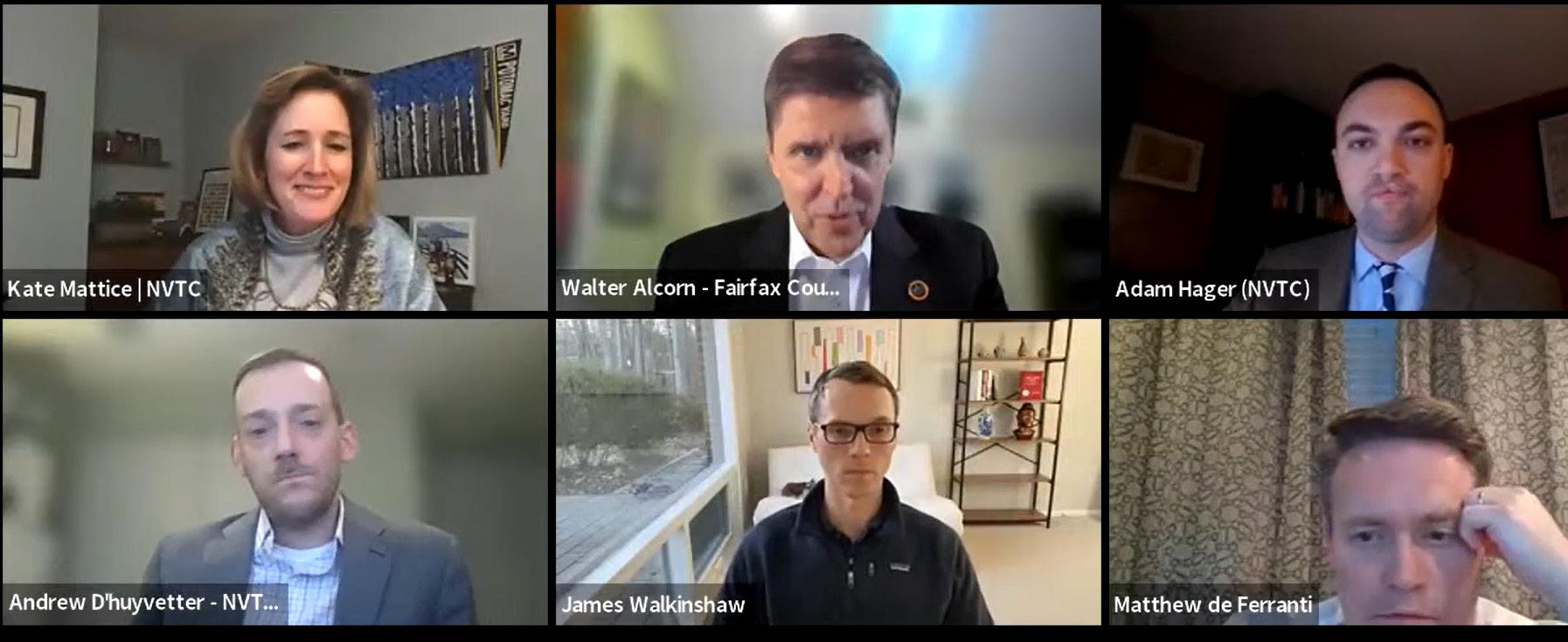
NVTC's WMATA Committee met virtually February 29 to review the Committee’s 2024 workplan, NVTC comments on WMATA’s FY 2025 proposed budget and NVTC’s Metro Operating Funding and Reform Working Group, as well as subsequent legislative efforts slated to build upon the report findings.
WMATA Senior Program Manager Andrew D’huyvetter and Senior Program Analyst Adam Hager briefed the committee on Metro’s FY 2025 proposed operating and capital budget before reviewing draft comments which indicated general support for the revised FY 2025 proposed budget and urged Metro and the region to remain focused on a long-term, sustainable funding solution. The committee took action to authorize Chair Walter Alcorn to submit comments by the March 5 deadline.
Staff also previewed the forthcoming Metro Operating Funding and Reform Working Group
report, highlighting several key revenue structure and reform opportunities. The committee discussed how the report might soon influence a potential legislative study as outlined in Senate Joint Resolution 28, which has passed the House and Senate. Should SJ28 advance, the Working Group report will provide substantial input into the joint subcommittee’s effort that aims to study long-term, sustainable, dedicated operations and capital funding for Metro and other Northern Virginia transit providers and study cost-containment controls and strategies. In its current version, NVTC will be represented on the joint subcommittee and will participate in a technical working group to support the effort.






Congratulations to Senior Program Manager Xavier Harmony, who we can now call Dr. Harmony. He successfully defended his PhD dissertation titled “Essays in Transportation and Electoral Politics” at Virginia Tech on February 6. Xavier’s PhD focused on transportation planning and policy, especially how politics affects transportation outcomes. His dissertation specifically helped answer two questions: 1) How important are transportation issues in elections?


2) Does voting for elected officials affect the amount of bus service delivered?




I was delighted to join the panel for ACEC Metropolitan Washington's DC Metro Region Transportation Luncheon February 27. The discussion topic was "Community-Driven Design in the Washington Metropolitan Region," with a focus on how the engineering industry can leverage creative ideas to solve transportation related challenges related to enhancing communities and encouraging new development. I spoke about the importance in
regional coordination to enhance transit project development and implementation as well as the need for long term sustainable funding for Northern Virginia transit systems. Other panelists who may be familiar faces to folks were Allison Davis of Metro, Robin McElhenny of Arlington County, Jay Corbalis of JBG Smith and John Landry of the Union Station Redevelopment Corporation.



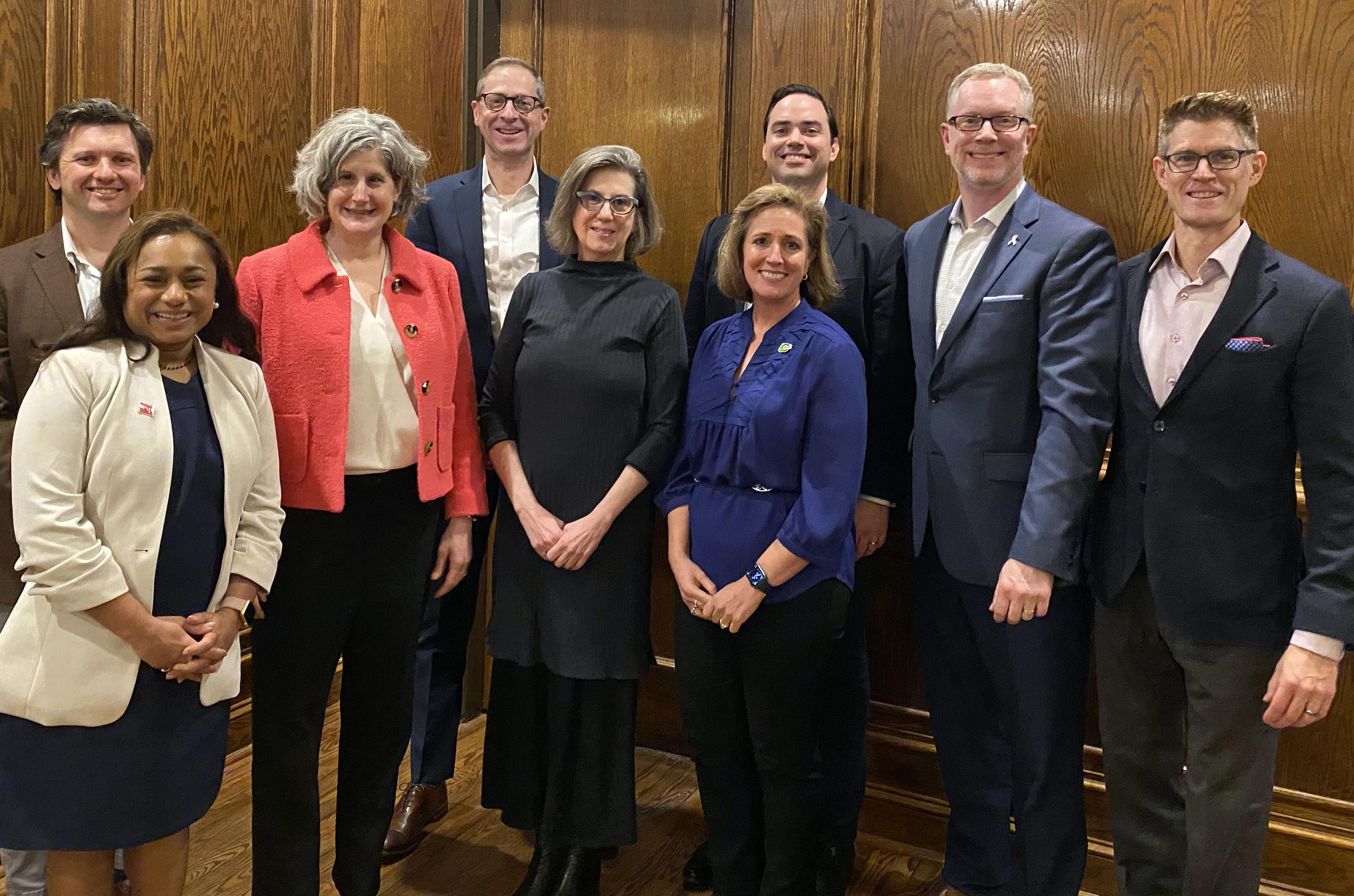







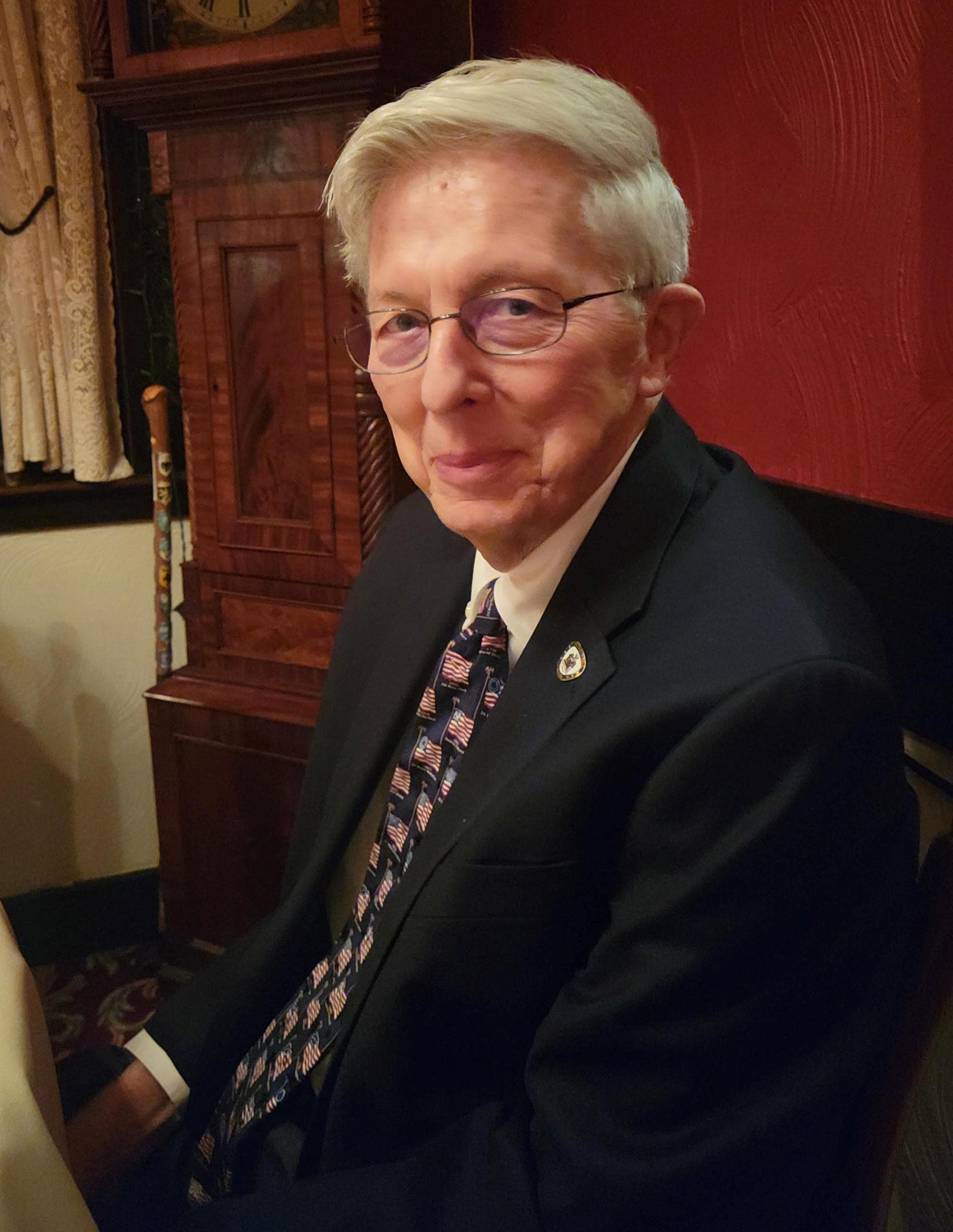
We mourn the passing of former Commissioner John Mason. The former City of Fairfax mayor died February 7 at age 89. Mr. Mason served on the Commission from 1990 to 1994 and as chair in 1993.
“John Mason lived his values every day and was generous with his time and his commitment to the things he took on,” Fairfax City Mayor and Commissioner Catherine Read said in a statement. “I see evidence of this all over the City of Fairfax, and I hear it across the region as elected leaders past and present speak of what he contributed to the success of the Northern Virginia region. His investments in the community he loved will reverberate across the generations, and we are the fortunate beneficiaries.”



